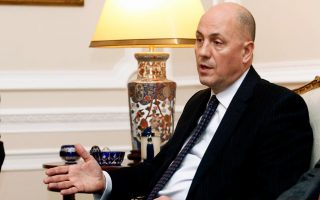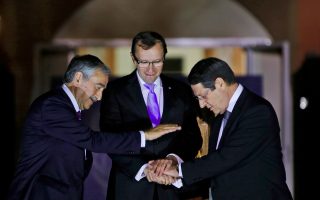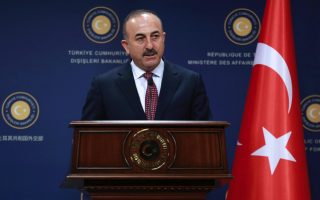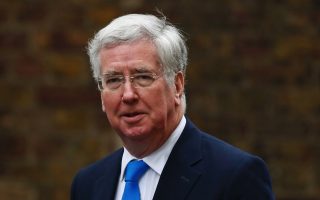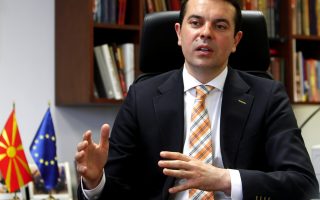Obama: Greeks ‘need hope’
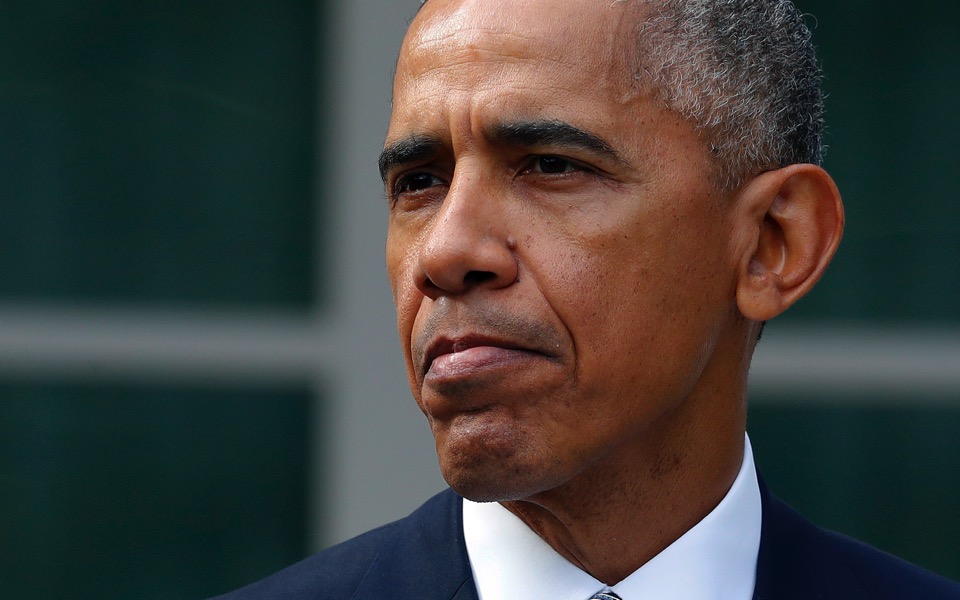
In a wide-ranging interview with Kathimerini, US President Barack Obama insisted that he will continue to urge the country's creditors to take the necessary steps that will ensure Greece returns to growth, including “meaningful debt relief.”
Speaking ahead of his two-day visit starting on Tuesday, the outgoing US president said that Greece must continue on the path of necessary reforms, which he said can only be sustainable if people are given hope.
Obama praised bilateral ties, lauding Greece's contribution to the NATO alliance despite its “economic hardships,” and the close cooperation on counterterrorism. He also commended the “inspiring” generosity the Greek people have shown to the refugees.
Has Greece become a “front-line state” in terms of security, energy and dealing with international terrorism? What does this mean for the US-Greek relationship? What is the message you want to convey to the citizens of Greece?
First, I want to say how much I appreciate the opportunity to visit Greece, and I thank Prime Minister [Alexis] Tsipras and President [Prokopis] Pavlopoulos for the invitation. My visit comes at a time when Greece is at the forefront of pressing challenges to our shared security and prosperity. The threat of terrorism from groups like ISIL endangers us all. The barbarity of the Assad regime in Syria and ISIL has contributed to the waves of migrants and refugees that have sought refuge in Europe, especially Greece. And on both sides of the Atlantic, we face the task of ensuring that our political institutions and economic policies are responsive to our people, many of whom feel that they have been hurt by globalization and trade.
My message – especially with my visit coming so soon after a hard-fought election campaign in the United States – will be that as our nations confront these challenges together, Americans continue to place enormous importance on our alliance with Greece. Despite facing extraordinary economic hardships, Greece is one of five NATO Allies that spend 2 percent of GDP on defense. We thank our Greek allies for our close cooperation at Souda Bay. We’re close counterterrorism partners and have to continue to share information and intelligence to stem the flow of foreign terrorist fighters and prevent terrorist attacks.
I’ve made clear throughout my presidency that as Greece continues to take the hard steps of reform at home and works to ensure that migrants are treated in an orderly and humane way, the Greek people will have a friend and partner in the United States. Meanwhile, with the rise of populist movements and questions about the future of European integration, my visit to Greece – the birthplace of democracy and an inspiration for America’s founders – will be a chance to reaffirm the enduring values of democratic governance, diversity and tolerance that help keep us strong. We see those values every day across our countries, including among the many Greek Americans who contribute to the success of the Unites States every day.
You have played an important role in making sure that Greece remains in the eurozone and have repeatedly stated that it should get serious debt relief. Why did you do this and what should the way forward be in terms of promoting reforms, dealing with the debt issue and the strengthening of European institutions? How can the US help Greece in this, in practical terms? Is this going to be a priority during your visit to Berlin?
Greece is a democracy, and the future of Greece will be decided by the Greek people. I have strongly supported efforts to keep Greece in the eurozone because I share the view of the vast majority of Greeks that this outcome is in Greece’s best interest. I believe that European integration is one of the greatest political and economic achievements of modern times, with benefits for EU members, the United States and the entire world. Europe is our largest economic partner and we have a profound economic interest in a Europe that is stable and growing.
Without question, Greece had to take steps to reform its economy, and I want to commend the Greek government, including Prime Minister Tsipras, and the Greek people for the very difficult and painful steps they’ve taken to show that Greece is working to help itself. The Greek budget is now in surplus and Parliament has passed tough reforms that will help make the Greek economy more competitive.
But there’s still clearly more to be done. My visit will therefore be an opportunity to reaffirm US support for reforms that improve the business climate, ensure that the imbalances that caused the crisis don’t re-emerge, and lay the foundation for a stronger economic recovery that helps improve the daily lives of the Greek people.
I am a strong believer that to make reforms sustainable, people need hope. The International Monetary Fund has said that debt relief is crucial to put Greece’s economy on a sustainable path and set the stage for a return to prosperity. This is why I will continue to urge Greece's creditors to take the steps needed to ensure the country is well placed to return to robust economic growth, including by providing meaningful debt relief. Getting that done would not only fuel the Greek economic recovery, it would also show that Europe can make its economy work for everyone.
Greece was forced to deal with the overwhelming challenge of the refugee crisis. How do you view its response and are you worried that it might undermine European unity and shared values? How can this crisis be resolved?
The entire world has been deeply moved by the compassion and generosity that the Greek people have displayed in the face of this heartbreaking crisis. We’ve seen Greek fisherman saving lives at sea, Greek communities offering food and supplies and clothing, and Greek families hosting refugees. All this generosity is even more inspiring – a true tribute to the decency and humanity of the Greek people – given the fact that Greeks have done so while continuing to deal with their own economic hardships at home.
Still, given the scope of this crisis, we all recognize that more needs to be done. As winter approaches, Greece can continue to work with humanitarian organizations to improve conditions for migrants in camps. At the refugee summit I hosted at the United Nations this fall, Prime Minister Tsipras made important commitments to increase housing for unaccompanied children and improve access to education for children who are migrants and refugees. As Greece’s ally and friend, the United States has provided humanitarian assistance to help with caring for migrants and our teams of experts have partnered with Greece on strengthening border security and screening of travelers. The United States supports NATO’s monitoring activity in the Aegean Sea to identify illegal crossings in the Aegean and inform local authorities – including the Hellenic Coast Guard.
As I’ve said before, a small number of countries – like Greece – can’t be expected to bear such a heavy burden alone. The response has to be coordinated and comprehensive, in Europe and around the world. That’s why we continue to support the deal between the EU and Turkey as the best hope for managing arrivals in Europe in a way that’s orderly and humane. It’s why, at the refugee summit, we helped galvanize more than 50 nations and international organizations to increase humanitarian assistance and double the number of refugees we admit to our countries and to help refugees become self-reliant. And it’s why we have to redouble our efforts to end the poverty, injustice, and conflicts – including Syria – that cause so many to flee their homes in the first place. In all of this, we have to stay true to the values and respect for human dignity that are at the core of our democratic, pluralistic societies. And while these values are indeed under pressure on both sides of the Atlantic, I continue to believe that the forces that bind our societies together are ultimately much stronger than the forces trying to pull us apart.
Turkish President Recep Tayyip Erdogan has questioned some of the international treaties that have preserved peace in the Aegean and the Eastern Mediterranean for many decades. What is your view on this matter and can the US play a role in maintaining stability in the area?
Despite the ongoing challenges in the Middle East, the EU and NATO are extraordinary forces for peace and stability. A large part of what has transformed Europe, a continent once plagued by war, into a zone of peace and prosperity has been the European embrace of democracy and human rights, economic openness, pluralism, and a rules-based system based on collective action. Europe shows that by embracing these values and practices, former rivals can become good neighbors and strong trading partners, and that a continent once wracked with conflict can move forward through trust and cooperation.
Europe’s progress also underscores the fact that prosperity and growth thrive in transparent, predictable, stable environments where the rule of law protects individual rights and provides local entrepreneurs the confidence they need to grow and international businesses the sense of security they need to invest. The United States shares these values, and is committed to continuing to play a leading role in ensuring that Europe is whole, free, and at peace. In the face of today’s transnational challenges such as migration, extremism, and economic dislocation, our best chance for progress is to resist the urge to turn inward and instead reinvigorate our shared values and work together to ensure that our political and economic institutions deliver the security and prosperity our people deserve.
Are you hopeful that the Cyprus issue could be resolved by the end of your administration and why is it important to the US?
Today, the prospects for a lasting settlement on Cyprus are the best we’ve seen in many years. The parties remain hard at work to achieve a bizonal, bicommunal federation that advances the interests of all Cypriots. I applaud the effort that the Cypriot leaders have put into the negotiations so far, and I hope they can soon arrive at a durable solution that will benefit all Cypriots.
A just and comprehensive solution for Cyprus would have historic and far-reaching impact. It would improve economic opportunities for all the people of Cyprus and enhance energy security in the Mediterranean region and beyond. It would create opportunities for US and European businesses – an alignment of interests that could be an engine for economic growth in the region. It could unlock new relationships and avenues of cooperation for Europe that would build on the decades-long project to make the continent freer, safer, and more prosperous. And it will demonstrate to the world today what can be achieved through dialogue, compromise, and diplomacy – a powerful and positive model for all.
